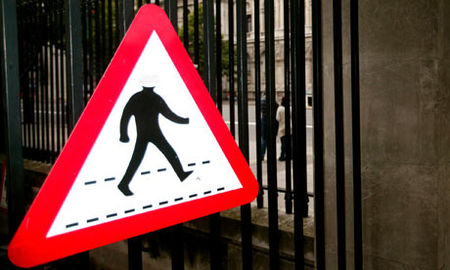Douglas Harding dans un quotidien anglais
Il y avait un article consacré à Douglas Harding dans le supplément couleur du Gardian ce matin en Angleterre. Le Guardian est un des quotidiens les plus respectés du pays.
jlr
One day in the early 1940s, a plummy-voiced English architect named Douglas Harding was hiking along a Himalayan ridge when he suddenly realised that he had no head. "This is not a literary gambit, a witticism designed to arouse interest at any cost," he writes in his slim book On Having No Head, which will shortly be 50 years old and which is either one of the most ridiculous or wisest things I've ever read. "I mean it in all seriousness: I have no head."
Photographs of Harding, who died in 2007, suggest otherwise: from the outside, he unmistakably did have a head, bald with a white beard beneath, like Father Christmas drawn by Raymond Briggs. Yet when he studied himself, "what I found was khaki trouserlegs terminating downwards in brown shoes, khaki sleeves terminating sideways in pink hands, and a khaki shirtfront terminating upwards in – absolutely nothing whatever! Certainly not a head."
Squinting, he could make out a nose; if he'd had a mirror, he could have seen a reflection. But turning his attention directly to the place above his neck where everyone else had a head? Nothing: an "ageless, measureless, lucid and altogether immaculate Void". This stunned him. "I stopped thinking… I forgot my name, my humanness, my thingness, all that could be called me or mine."
Like other memoirs of "enlightenment" that line the less salubrious shelves at Waterstone's, On Having No Head either works for you or it doesn't: it either jolts you into an altered perspective or leaves you feeling like you wasted several hours of your life. (Harding's friends certainly thought he was losing it: "When people start seeing things others can't see, eyebrows are raised, doctors sent for.") Unlike most such books, though, Harding's – while totally off-the-planet – is delightfully down-to-earth. There's no new age mumbo jumbo; it's mysticism for sceptics. Just look at the evidence, Harding says. Sure, you can achieve various sensations by scratching your chin or tapping your forehead, but that hardly amounts to evidence of a head – not compared with the clear evidence you have of other people's heads. He proposes an exercise: "Point to your feet, legs, belly, chest, then to what's above that. Go on looking at what your finger's now pointing to. Looking at what?" (There are others at headless.org.)
Yes, I know, I know. Perhaps a useful way to think about it is as follows: when Harding says "I have no head" he's more concerned with the "I" than the "head". This sense we have of being a separate self, living in our heads, is the cause of all our woes: stress and sadness and relationship troubles all result from how the self interacts with other selves. It's fundamental to all experience. Yet when we turn our attention directly to where we assume it's located, just behind the eyes, it's unclear what's there, or even what "there" might mean. The "I" that has a head doesn't appear to be a locatable, examinable thing at all. Which is weird – right?
Follow these ideas in one direction and you get to Zen Buddhism, in another and you end up at modern-day philosophy of mind. Or perhaps it all strikes you as tiresome stoner talk, which is fair enough, too. Personally, On Having No Head blew my mind. Indeed, it left me feeling as if my head was going to explode – which was doubly disorienting given that, according to Harding, I don't actually have one.
oliver.burkeman@guardian.co.uk





/http%3A%2F%2Fstorage.canalblog.com%2F85%2F48%2F191716%2F127539651_o.jpg)
/http%3A%2F%2Fstorage.canalblog.com%2F05%2F18%2F191716%2F65850522_o.jpg)
/https%3A%2F%2Fassets.over-blog.com%2Ft%2Fcedistic%2Fcamera.png)
/http%3A%2F%2Fstorage.canalblog.com%2F86%2F27%2F191716%2F128017672_o.jpg)